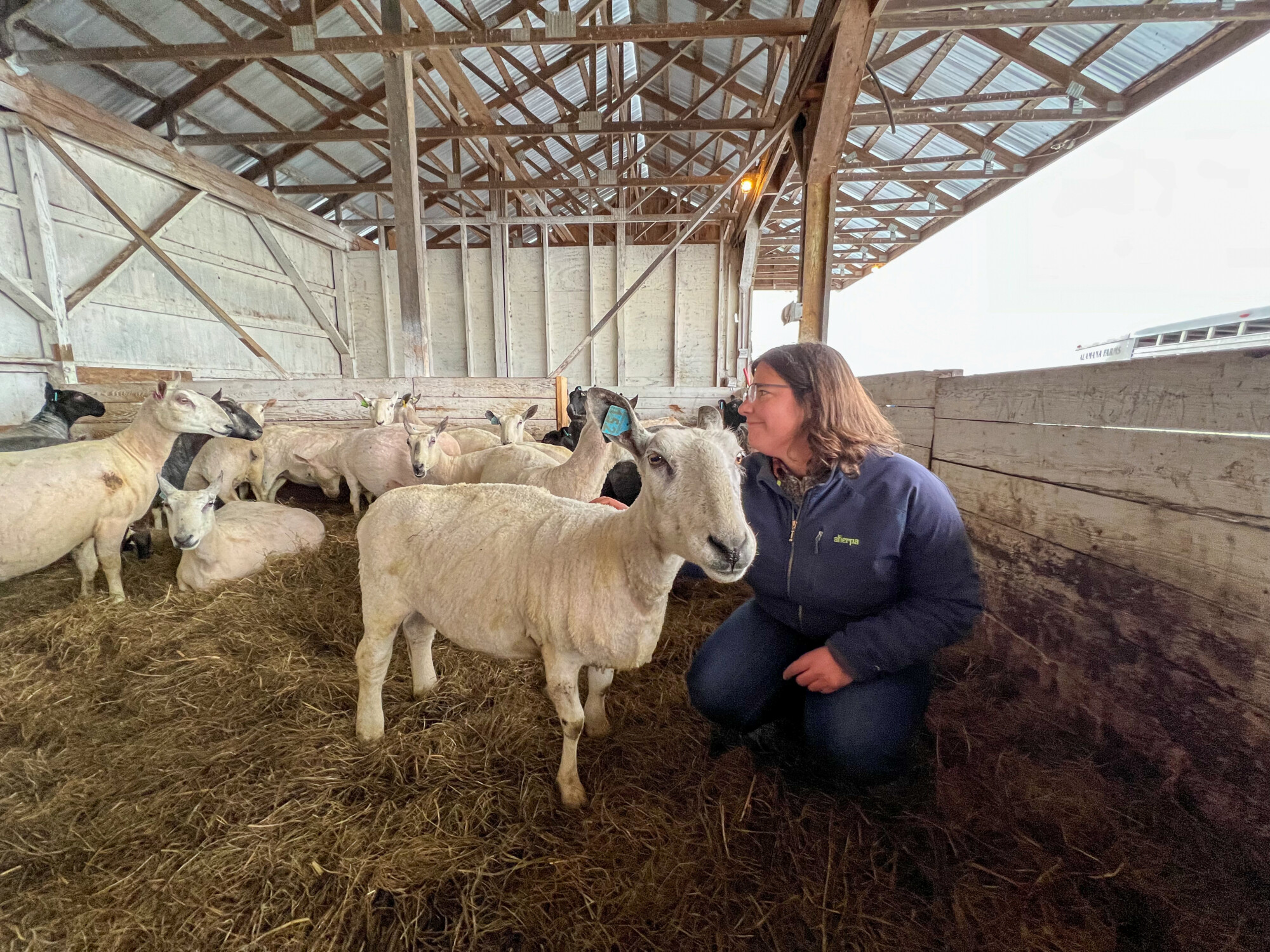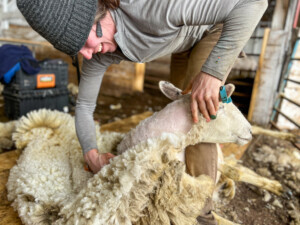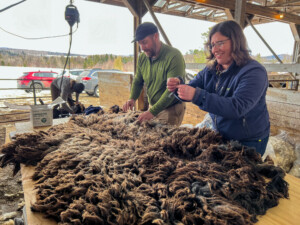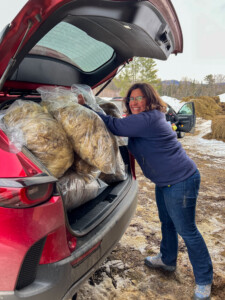Bobolink Yarns: Scaling Back to Find Success
April 27, 2023

For Bobolink Yarns founder Katie Sullivan, letting go of her big idea was the best business decision she made.
“I think we’re done,” Katie Sullivan, owner of Bobolink Yarns in Irasburg Vermont, told her business coach in January 2023.
Carolyn Cooke agreed. “She did the work, followed every thread, and uncovered every solution, but in the end, the business couldn’t scale. Katie has found success, but it looked different than she thought it would.”
In 2018, Sullivan had an idea. A working shepherd and fiber enthusiast, she saw an opportunity to solve two problems. On the one hand, she received more calls from yarn shops looking to buy her product that she could fulfill. On the other, she knew many shepherds in Vermont with barns full of wool and no plans for it. Her idea was to collect the wool, have it milled, and market it as a local product to Vermont yarn shops, tapping into a nascent, but growing, interest in locally made textiles.
“Textiles are on the cusp of where food was a few years ago in terms of people understanding that local has value,” said Sullivan, who has a background in specialty foods.
Her idea was met with enthusiasm from both shepherds and yarn shops, and she soon had a half dozen farms where she was collecting wool. Early on in the endeavor, she received a call from a UVM graduate student studying textiles and sustainability. They had a line on three tons of leftover wool from a Vermont manufacturer and wondered if she could “upcycle” the fiber. With that call, her idea expanded to include not only unused wool from farms, but leftover fiber from manufacturing.
“She left no stone unturned.”

Mary Lake of Can Do Shearing shears an ewe at Snug Valley Farm. The wool will be sold to Bobolink Yarns to be turned into a hand-dyed fingerling yarn.
Realizing that she had a real opportunity and needed support, she contacted the Vermont Sustainable Jobs Fund’s business coaching program, where she was connected with Cooke. Together, they explored every possible path for the wool, from specialty yarns to blankets to finished textiles, but none of them generated a return on investment that would allow the business to thrive. Sullivan had some success with making scarves from the upcycled wool, but there wasn’t enough demand for them. “I’m the proud owner of quite a few scarves,” she joked.
Two-thirds of the fiber she hoped to upcycle was too fine to be milled and couldn’t be made into any usable product. That was the biggest challenge, according to Cooke, and where the pair spent most of their time. “It was a great idea that just didn’t have any legs,” she said.
“I wanted so badly for it to be a successful venture,” said Sullivan. “But I realized with Carolyn’s help that even though I was not going to pursue this tremendous new initiative, I could make the best of what was working well with Bobolink Yarns and move on. There is so much value in having someone who has been there, done that say, ‘you tried everything’.”
Ready to greet her “grand-lambs.”

Ben Nottermann of Snug Valley Farm and Katie Sullivan of Bobolink Yarns skirt wool that will be turned into yarn.
This spring, Sullivan is helping to sort the wool from the flock she raised, which now resides at a nearby farm, and is looking forward to meeting her “grand-lambs” when they’re born in the next few weeks.

Katie Sullivan packs her vehicle full of wool to be turned into yarn for Bobolink Yarns.
She continues to carefully collect wool from farms around Vermont and is regularly tapped to consult with shepherds around the state on different breeds and the quality of wool they will produce. During the spring shearing season, she travels to farms to choose the best and most suitable wool for fiber, which she then turns into highly curated displays at local yarn shops. She and her mother, who is a pattern designer, recently made a “knit-your-own” hat kit for the U.S. Biathlon team in Craftsbury, which led to another request for a custom, DIY kit and pattern using local wool.
But Bobolink Yarns is a side gig to her current pursuit–a degree in counseling from Antioch, where she is enrolled in a graduate program.
“The answer was simply recognizing that Bobolink Yarns has a size constraint,” said Sullivan, “and that constraint is the yarn-to-tourist economy. The wonderful thing about Bobolink Yarns is that it’s right sized for me now and it keeps me connected to the shepherd community I love.”
About VSJF’s Business Management Coaching Program
The Vermont Sustainable Jobs Fund provides tailored, high-touch planning, coaching, and advising for business owners and their management teams to advance profitability, job creation, and sustainable job development. Click for more information about business management coaching. Funding support for our coaching program is provided by client fees, the Vermont Agency of Agriculture, Food and Markets and Vermont Housing & Conservation Board’s Farm & Forest Viability Program.
Read More Stories Like This:
- Hemp and Cannabis Pioneer, Scott Sparks, Navigates Legalization in Vermont
- Business Sense Training Series for Entrepreneurs and Small Business Owners
- Pioneers of African Cuisine, Global Village Foods Finds Community in Vermont
- For Olivia’s Croutons Founder, Coaching is the Best Thing Since Sliced Bread
- Slowing Down to Go Fast: Luce Farm Wellness Rides the CBD Wave





